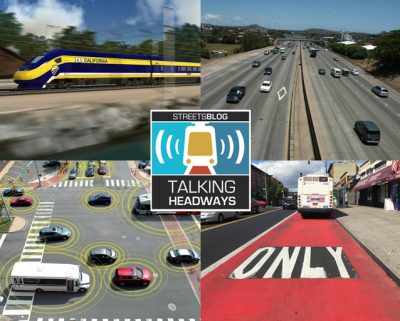This week, Yonah Freemark of the Urban Institute is back for our annual Prediction Show. This year, we chat about our predictions from last year and next year of course, but also regional rail in France, interesting transportation projects around the world, and the high cost and management of big transit projects.
If you like to read rather than listen, a full unedited transcript is here. If you want to read an excerpt before you decide to buy, check it out below the audio player:
Jeff Wood: One of my favorite things about watching your Twitter feed is when you’re in France, where they were talking about expanding regional rail in a number of different cities around the country. I’m wondering if you can share kind of what that information is and also maybe a little bit more about your experience when you’re there, in terms of transportation and policy and the things that you care about.
Yonah Freemark: I’ve been doing research in France for quite a while now because I spent some time there when I was a kid and I have connections there. So, I like doing research in France. One thing that’s interesting about French planning is that this concept of regional rail has been in the national mindset since the 1960s when the first decision was made to invest in this regional rail system in the Paris region. Unfortunately, since that time, while the regional rail system in the Paris region has expanded and frankly become the most important connection system for the region in terms of transportation. It serves millions of people a day.
This concept has not translated to other regions in the country. So, you have a lot of other major cities in France — Lyon, Toulouse, Bordeaux — that are relatively large but do not have a regional rail system with frequent trains that operate all day that go in both directions, the kinds of commuter rail systems that we wanna see in a lot of American cities, too. So there’s been some interest over the last few years in thinking about how to extend regional rail. And the president recently announced that they want to invest a significant amount of national funds in instituting regional rail systems in 10 or so urban areas throughout the country.
And I think this has a lot of potential for changing commuting patterns throughout France because it can leverage their already very extensive railway network in a better way for the people who live in these rather large urban regions that, you know, metro or tramway systems cannot because they can go much further across the regions and they can do so at a much faster speed.
I’m perhaps most interested is the current plan for the constructor of the Paris Region Metro Expansion program, which is called La Société du Grand Paris. So, the Grand Paris company to build or at least manage the rollout of these regional rail lines. This is really interesting because this is a public authority that was created by the national government in 2010 to manage the development of 200 kilometers of new metro lines in the Paris region. And they’ve been doing pretty well at it.
I was able to visit some of their construction sites the last time I was in France, see some of their new subway stations that are under construction, you know, outside of the city. And what I thought was really interesting about the government’s announcement was they were focused on trying to identify a government public sector agency that would have these sort of management skills, the capacity to actually move forward with a major construction project.
And that’s something that I see as lacking in the United States. I think we have a big problem with lack of public sector capacity to get major infrastructure works to a large degree done, but especially public transportation and inner-city rail. We don’t have great experience in that in many parts of the country. And so it often feels like we’re starting from scratch when it comes to developing new projects. And I think we’ve seen a lot of that with the California High Speed Rail Project where, you know, the state has a big ambition, folks want a high speed rail line, but the capacity to actually get it done affordably and on time is, is clearly not there. And I’m excited by the idea that the national government would say in France, we have this agency that we know is capable of building a big construction project, we’re gonna allow them to take the lead on teaching other regions around the country on how to do this.
And so, this is gonna be really interesting to watch and I suspect it could be something that we could learn from in the United States as well.
Jeff Wood: Stay tuned for our predictions.







